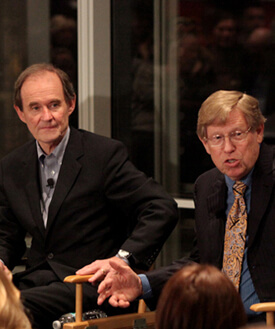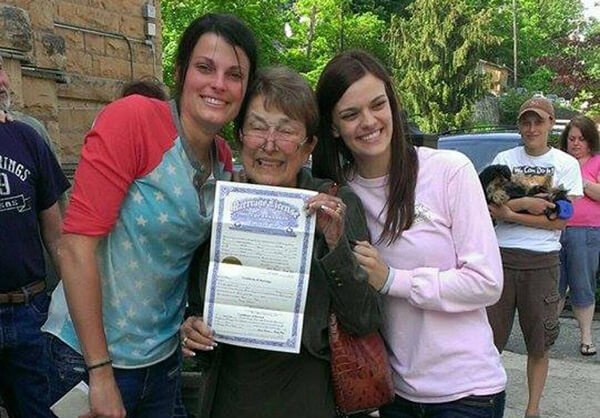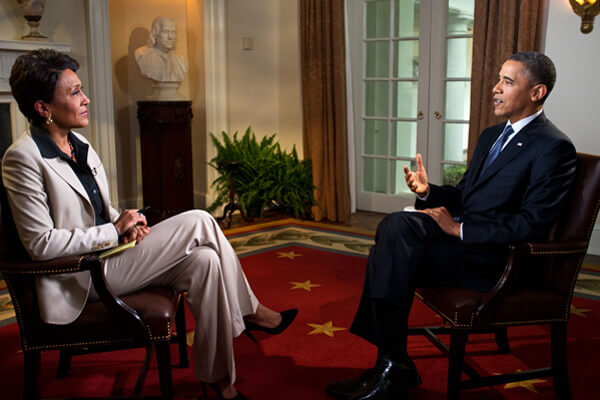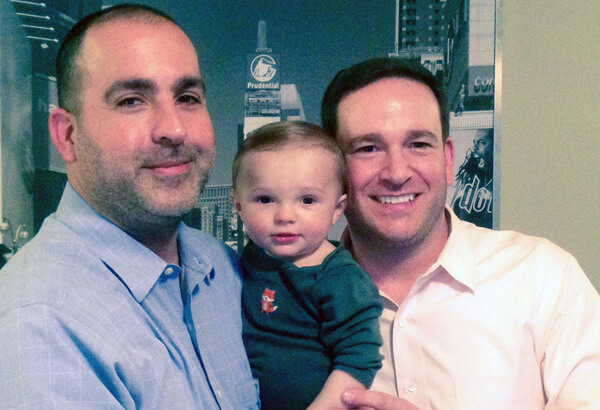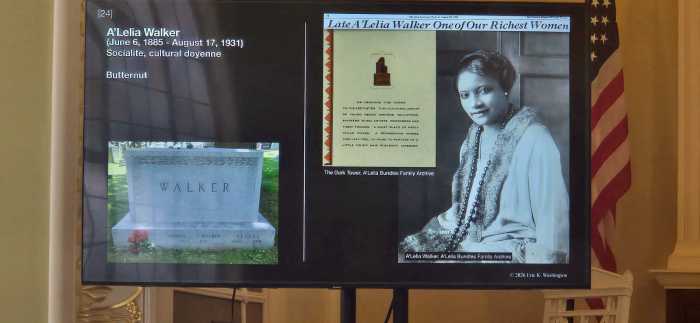David Boies and Ted Olson, lead attorneys on behalf of AFER, at a March 2010 TimesTalk forum. | COURTESY: SARA KRULWICH/ THE NEW YORK TIMES
With the US Supreme Court holding that the Official Proponents of California’s Proposition 8 cannot challenge a federal district court decision that the 2008 ballot initiative banning gay marriage is unconstitutional, advocates are promising that gay and lesbian couples will soon be able to wed in that state.
“This is a great day for our clients, who now finally can get married, and for gay and lesbian couples in California, all of whom now can get married to the people they love,” said David Boies, an attorney who represented the two couples in the case.
In 2008, California’s highest court ordered the state to issue marriage licenses to gay and lesbian couples. Conservative groups responded by placing the ban on the ballot and voters approved it that year.
No day in court for basic right to marry, but victors say no roadblock now to California weddings
Chad Griffin, the founding board chair of the American Foundation for Equal Rights (AFER), recruited Boies and Ted Olson, two high profile attorneys, to challenge the ban in federal court in 2009. Judge Vaughn Walker, who has since retired, ruled that the ban was unconstitutional in 2010.
Two governors, Arnold Schwarzenegger and later Jerry Brown, and two state attorneys general would not defend the state constitutional amendment. The Official Proponents of the ballot initiative took on that role. They lost before Walker and before a federal appeals panel in 2012. They appealed to the Supreme Court, which ruled against them on June 26.
“For there to be such a case or controversy, it is not enough that the party invoking the power of the court have a keen interest in the issue,” Chief Justice John Roberts wrote for the 5-4 majority. “That party must also have ‘standing,’ which requires, among other things, that it have suffered a concrete and particularized injury. Because we find that petitioners do not have standing, we have no authority to decide this case on the merits, and neither did the Ninth Circuit.”
In another 5-4 ruling, the court also struck down the federal Defense of Marriage Act, which barred federal recognition of same-sex marriages, on June 26. The decisions in both cases were notable for their odd alignments of liberal and conservative judges joining to form the DOMA and Prop 8 majorities.
While some observers have asserted that Walker’s ruling, which stands as the final word on Prop 8, applies only to the two couples or the two county governments that denied them marriage licenses, Dennis Herrera, San Francisco’s city attorney, said on a conference call that Brown and California’s state registrar had sent a directive to county clerks on June 26 saying that they must issue marriage licenses to gay and lesbian couples.
Asked about threats by conservatives to go to court to halt the statewide implementation of marriage, Theodore J. Boutrous, Jr., an attorney who worked on the case, said, “They have no standing, they can’t go into court.”
Speaking of Kamala Harris, California’s attorney general, and Brown, Boutrous said, “Their view is this applies statewide and that’s determinative.”
Boies said that a “renegade clerk” might refuse to issue marriage licenses to gay and lesbian couples, but he added, “There will be a quick remedy for that.”
While there will be a short delay as the Supreme Court’s decision is sent to the lower courts, gay groups will move “as fast as we possibly can,” Griffin said.
“Marriage is starting very, very soon in the great state of California,” said Griffin, who is now the president of the Human Rights Campaign (HRC), the nation’s largest gay lobby.
AFER began the case with bold predictions about its impact. In a 2011 conference call with reporters, Griffin said the group’s “goal is marriage equality” and “federal recognition of that in all 50 states.”
In 2009, the New York Times paraphrased Olson saying that he hoped the suit “will lead to a Supreme Court decision with the potential to reshape the legal and social landscape along the lines of cases like Brown v. Board of Education and Roe v. Wade: the legalization of same-sex marriage nationwide.”
While the June 26 decision is a victory, it is one that fell well short of AFER’s stated goal. On the conference call, activists and attorneys were vague about plans for future lawsuits.
In 2009, Griffin was praised as a risk-taker and a visionary while legal groups that had track records of winning marriage cases in state courts were seen as merely guarding their turf as they openly expressed doubts about going into federal court. While they believed AFER would win in the lower courts, they feared the US Supreme Court would uphold marriage bans. Neither the rosy predictions nor the dark visions were realized in the Prop 8 decision. Griffin and the groups fought publicly during the litigation’s earliest days.
Asked for comment via email, HRC issued a 500-word history titled “The Perry Legacy.” The title is a reference to Kris Perry. She and Sandy Stier are one of the two couples.
“Bottom line, the marriage movement will continue and we won’t rest until we have marriage in all 50 states,” Fred Sainz, an HRC spokesman, wrote. “Perry is an amazing building block to that day.”
On August 1, when Minnesota’s marriage law takes effect, 12 states and the District of Columbia will allow same-sex couples to wed. California will bring the total to 13. Thirty-five states explicitly ban such unions either by statute, state constitutional amendment, or both.

